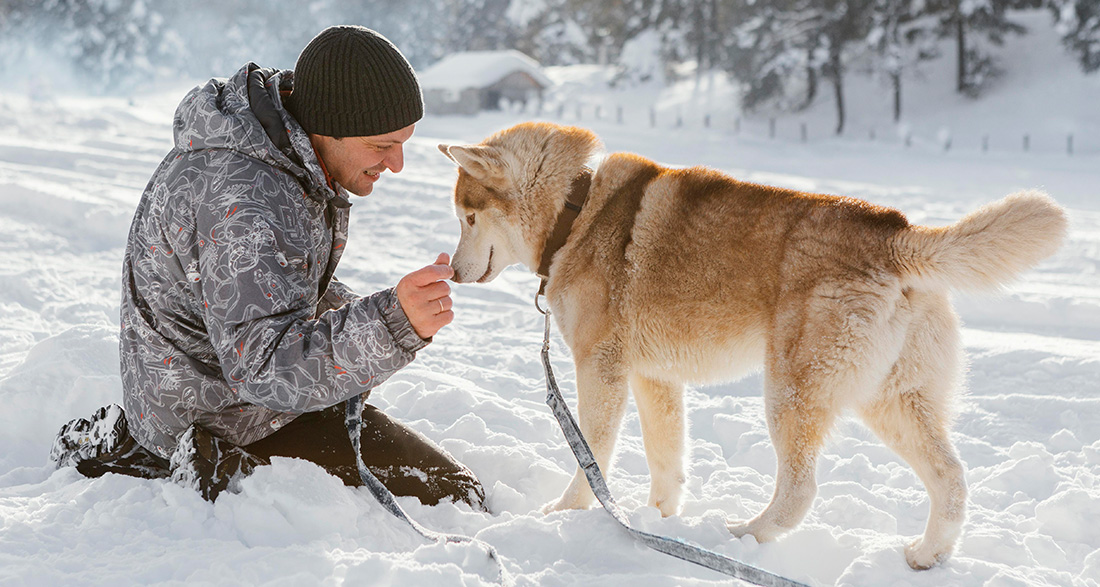For many dogs, there is nothing more enjoyable in winter than fresh snow. It invites them to frolic, play, and roll around. From a scent perspective, snow is a true paradise for our four-legged friends, as smells are particularly well-trapped within it. So why should this white beauty pose a danger to dogs? The issue arises when dogs eat the snow – often resulting in an unpleasant condition known as snow gastritis.
What happens when dogs eat snow?
Eating snow can lead to inflammation of the stomach lining, medically referred to as gastritis, in some dogs. The cold snow and impurities in it (such as road salt or gravel) irritate the delicate stomach lining, causing inflammation. Snow gastritis in dogs can manifest through the following symptoms:
- Tense abdomen/abdominal pain
- Loud gastrointestinal noises (gurgling)
- Increased salivation
- Vomiting
- Diarrhea
- Loss of appetite
- Fever
In severe cases of gastritis, there may be bleeding of the stomach lining, with small amounts of blood visible in vomit or diarrhea.
What can you do if your dog has eaten snow?
Firstly, don’t panic! If a dog eats snow, it doesn’t always lead directly to gastritis. Some dogs can fill their stomachs with it without any issues, and small amounts of clean snow don’t bother most furry friends. Problems only arise if your pet has a sensitive stomach or if the snow is contaminated.
Bland Diet:
If your dog is suffering from snow gastritis, refrain from feeding it for 24 hours. Withholding food gives the stomach lining a chance to calm down. Afterward, you can gradually reintroduce your pet to a easily digestible gastrointestinal bland diet – start with small amounts, but more frequently. Suitable bland diet options include boiled chicken or low-fat cottage cheese with boiled rice or potatoes. The classic mixture consists of one part chicken or cottage cheese and two parts rice or potatoes. Alternatively, ready-made gastrointestinal diets are available from veterinarians.
The gastrointestinal bland diet is not only easily digestible but also helps prevent vomiting due to its low fat and fiber content. This accelerates stomach emptying, reducing the time stomach acid stays in the stomach.
Hydration:
Vomiting and diarrhea cause a significant loss of fluids in the body. Hence, it is crucial that your dog consumes plenty of fluids during gastritis. Ensure that your furry companion always has access to fresh, not too cold water. To encourage drinking, you can add a bit of chamomile tea or homemade meat broth to the water.
When should you go to the vet?
If there is bloody diarrhea or bloody vomiting, do not hesitate to consult a veterinarian – the same applies if the dog is very lethargic, has a fever, if the symptoms do not improve or worsen after 1-2 days. With antispasmodic drugs and anti-vomiting medications, the vet can alleviate the symptoms of snow gastritis. Additionally, for faster regeneration of the stomach lining, the vet may prescribe specific medications that form a protective layer over the lining or reduce acid production in the stomach.
How can you prevent dogs from eating snow?
Because dogs usually have so much fun playing and frolicking in the snow, it’s challenging to completely prohibit it. However, if you have a dog that eats a lot of snow or has a very sensitive stomach, you should at least avoid encouraging it through play, search games, or throwing snowballs. At streets or paths where a lot of road salt or gravel is spread, it usually helps to keep the dog on a leash. In severe cases, you may even need to use a muzzle or train a recall command.
By the way:
Road salt is not only a danger when eating snow but also causes problems for the paws. It removes moisture from the skin between the paws and on the pads. This can lead to cracked pads and skin inflammation. Additionally, when the dog licks its paws, it ingests the road salt, which can, in turn, lead to stomach lining inflammation. Therefore, after a walk, clean and dry the paws with lukewarm water. You can also use paw balm* to additionally care for the sensitive paws.


